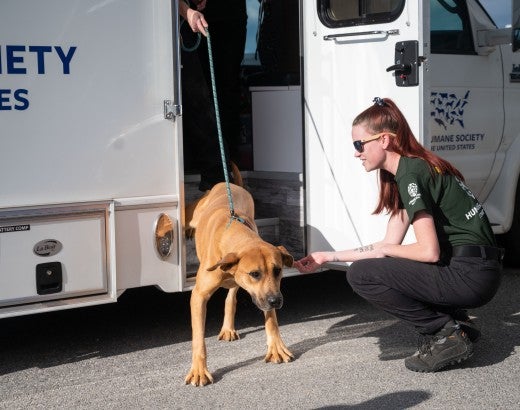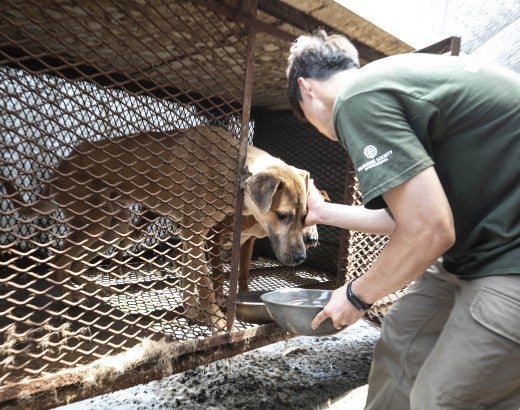Early this morning, 171 dogs from South Korean dog meat farms landed at Dulles International Airport to start new lives, and on this first day of their bright futures, I am reminded of how critical our day-to-day work is.
Every time Humane Society International shuts down a dog meat farm it has a reverberating positive impact even beyond those dogs being rescued. But this work is also extremely difficult, especially in the time of COVID-19. That our rescuers figured out how to close farms and save these dogs during a global pandemic, on top of the usual difficulties — witnessing of the realities at the dog meat farms of South Korea — is nothing short of extraordinary.

Rows and rows of wire cages, containing dog after dog after dog. Those who are strong enough, stand up and wag their tails whenever anyone walks by; those who aren’t remain huddled in the corners of their cages, skeletal and starving. These are just some of the memories that comes back to me from the times I’ve been at these farms. Beyond the visual memories — and perhaps more haunting — is what I have heard: Silence punctured by whimpers and intermittent barks, almost shrill with need, yet somehow, at the same time, hopeless, as if the dogs calling out know they have nothing to do but wait for their short lives to be over, slumped against the wire walls of their cages. Memories like these aren’t easy for our rescuers to bear, no matter how many dogs we rescue from the dog meat trade.
Working with our remarkable Korean partners to end the practice of dog farming in South Korea is not just saving lives, but also helping to bring dogs into view as loving and loyal companions, while giving willing farmers alternative ways to make a living. Korean dog farmers who want to leave the dog meat industry work with HSI to coordinate the rescue of dogs they raised and transition to more humane and profitable livelihoods. It’s a particularly powerful moment when the emptied cages are demolished, ensuring that no animals will suffer on the farms again and signaling a new future for the farmers. Plus, there’s a growing movement within the country to see former meat farm dogs as adoptable.

Rescuing dogs from the dog meat trade is, of course, complicated in the time of a pandemic. All the farm closures were conducted under COVID-19 health and safety restrictions. A veterinarian tests the dogs for the H3N2 virus (“canine influenza”) and the dogs also get vaccinated for a range of diseases. HSI then quarantines the dogs for at least 30 days before their flight.
As today marks the start of whole new lives for our 171 survivors of the dog meat trade, I feel hope knowing that they all were saved from painful slaughter and certain death. I know that each one of those caged dogs has the potential to be the loving, caring member of the family that my dog, Lilly, is. And soon they will have that opportunity.

First, the pups rest and recover at our temporary shelter site in Maryland where they will receive veterinary care, assessment and rehabilitation before placing them with our shelter and rescue partners, who will place them in loving homes in the U.S. and Canada.
It’s a really good day for these dogs and for people who care about making the world a kinder, more humane place. There’s a moment from some of the footage shot during the recent dog farm rescue that now sticks in my memory as a symbol of hope and progress. A wire door of a dog’s cage opens, and one of our rescuers climbs inside. She sits with the dog, stroking his head and ears, telling him that it’s all going to be alright, that the worst is over. And once the dog has calmed down enough, she coaxes the dog out of the cage, which is the only world these dogs have ever known — until now.



